|
|
|
Sort Order |
|
|
|
Items / Page
|
|
|
|
|
|
|
| Srl | Item |
| 1 |
ID:
181939
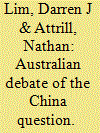

|
|
|
|
|
| Summary/Abstract |
Debate within Australia regarding the bilateral relationship with China is complex, contentious and often lacks clarity. Informed by basic international relations theory, we identify two dividing lines within this debate. First, whether understanding China’s behaviour is most effectively done through a unitary actor framework, or whether it is essential to look inside the ‘black box’ of the Chinese party-state. Second, whether one is more concerned about the ‘Thucydides trap’ or ‘Munich’—that is, are the consequences of an overreaction or an underreaction more concerning when interpreting China’s intentions and responding to perceived threats. These dividing lines generate four ideal-type policy viewpoints that we label Balancers, Hedgers, Engagers and Reformers, and apply in the Australian context. We then overlay our framework onto the public debate in Australia, selecting a specific bounded case study: commentary and analysis concerning China’s behaviour throughout the COVID-19 pandemic of 2020, in particular responding to Australia’s call for an international inquiry. Our objective is to progress an often circular debate by offering an accessible frame that clarifies and synthesises fundamental disagreements.
|
|
|
|
|
|
|
|
|
|
|
|
|
|
|
|
| 2 |
ID:
192165
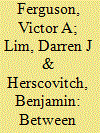

|
|
|
|
|
| Summary/Abstract |
For nearly four decades, Australia’s domestic and international economic policies were anchored by the promotion of open, transparent, and rules-based market exchange. This was considered the best way to increase both Australia’s prosperity and its security, and that belief guided Canberra’s approach to economic statecraft. However, emerging concerns about the vulnerabilities arising from economic interdependence, and the increasingly blurry line between economics and security amid great power rivalry between China and the United States, have placed Australian policy orthodoxy in a difficult position. In this paper, we investigate how these dynamics are shaping change and continuity in Australia’s economic statecraft, and in doing so offer three contributions. First, to advance the emerging comparative economic statecraft research agenda, we propose a modified concept of economic statecraft that captures a wider range of activities undertaken by non-great powers and a distinction between state-based and market-based actions which allows for within- and cross-case comparisons. Second, empirically, we sketch the historical evolution of Australia’s approach and examine three salient domains in which it has recently pursued new economic statecraft initiatives. Finally, in evaluating recent change and continuity, our third contribution is to identify new variables that may illuminate the conditions under which states adapt their prevailing approach to economic statecraft.
|
|
|
|
|
|
|
|
|
|
|
|
|
|
|
|
| 3 |
ID:
192014
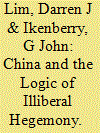

|
|
|
|
|
| Summary/Abstract |
We develop a theoretical logic and character of a Chinese model of international order. We begin by considering general problems of power transition and hegemonic order-building, with reference to the American experience with liberal hegemony. China will, like all powerful states, seek an order that protects its interests. But unlike its predecessors, China faces an existing order containing elements that threaten its domestic political and economic model. We describe this domestic model and consider how it might be defended at the international level—embedded in the logic and organizational principles of hegemonic order. Our contribution is to theorize the consequences of China’s hegemonic interests, including domestic preservation, and its order-building practices, for the operation and underlying character of a China-led hegemonic order. Though not inherently illiberal in form, we outline how the emergent order could generate illiberal outcomes. This article therefore theorizes the concept of illiberal hegemony.
|
|
|
|
|
|
|
|
|
|
|
|
|
|
|
|
| 4 |
ID:
174784
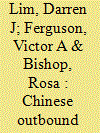

|
|
|
|
|
| Summary/Abstract |
China’s growing economic strength provides Beijing with potent instruments of economic statecraft to pursue political and strategic objectives. Yet studies of economic power and Chinese economic statecraft tend to concentrate on trade in goods, outbound investment, and international institutions. This article broadens this research program into trade in services by focusing on China’s outbound tourism sector. Drawing on a variety of Chinese and English language sources, the authors describe the history and structure of the domestic regulatory framework governing Chinese outbound tourism, before studying instances where the government has apparently intervened for strategic purposes. By unpacking how Chinese consumers arrange overseas holidays, this article provides insights into how the market structure of this service industry creates both opportunities for and constraints on China’s economic power.
|
|
|
|
|
|
|
|
|
|
|
|
|
|
|
|
| 5 |
ID:
119960


|
|
|
|
|
| Publication |
2013.
|
| Summary/Abstract |
In a well-publicized finding, Bueno de Mesquita and Smith argue that temporary members of the United Nations Security Council (UNSC) suffer politically and economically because they receive elevated inflows of foreign aid in exchange for votes. Closer examination of the data reveals a lack of support for this claim. Even when the analysis is limited to countries that do not enjoy temporarily increased aid during tenure, UNSC membership retains an association with poor outcomes that are disproportionately strong in nondemocratic countries, contrary to the expectation generated by selectorate theory. A separate least-likely test specification further weakens the case against foreign aid. The authors postulate and weigh alternative explanations. Temporary membership may enable deleterious state policy through a lessened fear of international sanction. Alternatively, the membership selection process may be biased in a way not currently recognized by scholars who employ UNSC election as a source of exogenous variation in the international system.
|
|
|
|
|
|
|
|
|
|
|
|
|
|
|
|
| 6 |
ID:
160459
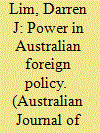

|
|
|
|
|
| Summary/Abstract |
The 2017 Foreign Policy White Paper emphasises the importance of ‘maximising’ Australia’s power and influence. However, the White Paper and much of the commentary on Australian foreign policy do not clearly conceptualise ‘power’ or indicate how it ought to be increased. The Lowy Institute’s recent Asia Power Index implies one possible strategy via its resource-based approach to measuring power. We outline a different approach and argue that power should be conceptualised and evaluated as a specific relationship causing behavioural change, rather than as a general attribute of its wielder. To complement the Lowy Institute’s carefully catalogued database, and facilitate a more focused conversation about maximising power and influence in Australian foreign policy, we offer a typology identifying five pathways through which states can translate their material and non-material resources into outcomes that serve the national interest.
|
|
|
|
|
|
|
|
|
|
|
|
|
|
|
|
| 7 |
ID:
143744


|
|
|
|
|
| Summary/Abstract |
It is widely claimed that secondary states across East Asia are not purely balancing or bandwagoning, but rather hedging between the United States and China by combining policies of economic and political engagement with risk management. We argue that hedging behavior should not include costless activities that do not require states to face trade-offs in their security choices. We redefine hedging as signaling that generates ambiguity over the extent of a secondary state's shared security interests with great powers. This definition returns the focus to security relationships and better accounts for the trade-off between autonomy and alignment. Based on this definition, we argue that hedging occurs in far narrower (but arguably more interesting) circumstances than is widely believed. Many Asian states have existing treaty alliances with the United States or major territorial conflicts with China, creating path dependencies that reinforce balancing behavior rather than hedging. We therefore clarify cross-national variation in state behavior and contribute to the larger research project on regional responses to China's rise.
|
|
|
|
|
|
|
|
|
|
|
|
|
|
|
|
| 8 |
ID:
167502


|
|
|
|
|
| Summary/Abstract |
China’s growing trade, investment, and aid links are commonly believed to constitute a potent instrument of statecraft, generating important security externalities. Yet there is insufficient research tracing the precise mechanisms linking economic relationships between a “sender” and “target” state to actual influence in the security domain. We offer three contributions. First, we map out the theoretical mechanisms of influence in a sender–target relationship. Second, we empirically investigate these mechanisms through a case study of China’s economic influence in Sri Lanka since 2009. Third, we use our findings to generate new insights on the mechanisms of influence in the economic statecraft literature and the dynamics of great-power competition in South Asia. Beijing’s ability to convert its considerable economic resources into strategic influence in Sri Lanka is currently hampered by the poor planning and implementation of infrastructure projects, domestic politics, and Sri Lanka’s relationship with India, a regional competitor and rising power.
|
|
|
|
|
|
|
|
|
|
|
|
|
|
|
|
|
|
|
|
|